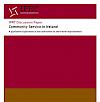11th October 2017
‘Examining the comparative use, experience, and outcomes of community service orders as alternatives to short prison sentences in Ireland’ by Dr Kate O’Hara is the outcome of a 3-year employment-based PhD research project (2013-16), co-funded by the Irish Research Council and IPRT, in association with Dublin Institute of Technology.
The research examined the application of Community Service Orders (CSOs) and short prison sentences across court type and jurisdiction from 2011. The experiences and perceptions of punishment by those who received alternate sanctions were also explored.
Dr O'Hara's PhD is available for download here

Our Discussion Paper Community Service in Ireland, is based on the doctoral research of Dr O'Hara. IPRT believes that Ireland’s penal policy should be focused on non-custodial responses to crime, with rehabilitation and social integration at its centre. The paper outlines key points regarding the use of community service, such as:
The IPRT Discussion Paper also outlines 20 key recommendations as to how community service could be better utilised in Ireland. If implemented, IPRT believes that these recommendations would help promote consistency in the use of CSOs as an alternative to imprisonment nationally, enhance public confidence in its effectiveness as a response to offending behaviour, and achieve the full potential of non-custodial alternatives.
Examples of these recommendations are as follows:
This paper extends IPRT’s position on community-based alternatives to prison, as set out in the IPRT Position Paper 8 Community Sanctions (2010).
Details on the launch of the Discussion Paper and Dr O'Hara's research can be found here. Photos from the launch are available on our Flickr here.
Media coverage:


| S | M | T | W | T | F | S |
|---|---|---|---|---|---|---|
| 1 | 2 | 3 | 4 | 5 | 6 | 7 |
| 8 | 9 | 10 | 11 | 12 | 13 | 14 |
| 15 | 16 | 17 | 18 | 19 | 20 | 21 |
| 22 | 23 | 24 | 25 | 26 | 27 | 28 |
| 29 | 30 | 31 | ||||
| September | November | |||||




Respect for rights in the penal system with prison as a last resort.